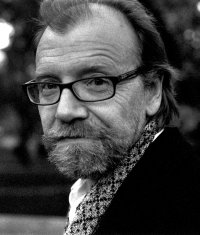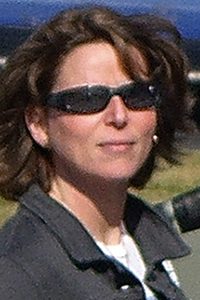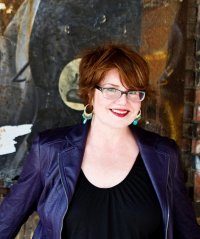George Saunders: Irrational Skills
 George Saunders was born December 2, 1958 in Amarillo TX and grew up outside Chicago, attending high school in Oak Forest IL. He earned a BS in geophysical engineering from the Colorado School of Mines in Golden CO in 1981, working in Sumatra as a field geophysicist for a year and a half before returning home and working various jobs, including as a doorman, roofer, clerk, and slaughterhouse worker. In 1996 he began attending Syracuse University, where he met future wife Paula Redick; their first daughter was born in 1988, and their second in 1990. He graduated with a MFA in 1988, and worked as a technical writer for a pharmaceutical firm and then an environmental engineering firm from 1989-96. In 1997 he joined the faculty at Syracuse as a creative writing teacher, where he still teaches today.
George Saunders was born December 2, 1958 in Amarillo TX and grew up outside Chicago, attending high school in Oak Forest IL. He earned a BS in geophysical engineering from the Colorado School of Mines in Golden CO in 1981, working in Sumatra as a field geophysicist for a year and a half before returning home and working various jobs, including as a doorman, roofer, clerk, and slaughterhouse worker. In 1996 he began attending Syracuse University, where he met future wife Paula Redick; their first daughter was born in 1988, and their second in 1990. He graduated with a MFA in 1988, and worked as a technical writer for a pharmaceutical firm and then an environmental engineering firm from 1989-96. In 1997 he joined the faculty at Syracuse as a creative writing teacher, where he still teaches today.
Saunders is a bestselling and critically renowned literary author who often writes work of SF interest, frequently for satirical ends. His first work of SF interest was ‘‘Offloading for Mrs. Schwartz’’ in The New Yorker (1992), and other notable short works include World Fantasy Award winner ‘‘CommComm’’ (2005) and Stoker Award finalists ‘‘The Red Bow’’ (2003) and ‘‘Home’’ (2011). Many of his stories take place in dystopian near-future milieus, and some of his short work is collected in PEN/Hemingway Award finalist CivilWarLand in Bad Decline (1996), Pastoralia (2000), Story Prize finalist In Persuasion Nation (2005), and Tenth of December (2013). The latter won the first Folio Prize as well as the 2013 Story Prize. Other books include fantasy novella The Very Persistent Gappers of Frip (2000) and satire The Brief and Frightening Reign of Phil (2005). In addition to fiction, he is known for his travel writing. Some of his non-fiction work is collected in The Brain-Dead Megaphone (2007).
Saunders has received numerous awards and honors, notably a MacArthur Fellowship (or ‘‘genius grant’’) in 2006, a Guggenheim Fellowship that same year, and an Academy Award from the American Academy of Arts and Letters in 2009. He lives in the Catskills with his wife.
Excerpts from the interview:
‘‘Tenth of December has gotten a lot of attention, but I just get to work. That’s how I deal with it. I started something new before the book came out; it’s so hard, and it’s just the right project – it’s challenging me on all fronts. That’s the best thing. It’s like an antidote. When I go out on the road and get an elated feeling, an agitation almost, it’s pleasant, but it’s like a sugar buzz. I like going back to my room, and there’s that stack of paper, and it’s like, ‘I’m over here, and I still suck.’ That is kind of grounding. I’m teaching now, so I’m reading Gogol and Tolstoy, and thinking, ‘Shit, I haven’t done anything yet.’ Turn that stuff off and get back to work. It’s good to enjoy the windfall, but it’s like a beautiful butterfly that comes along and lands on your head, and that’s cool. But if you mistake it for a hat, you’ll be disappointed – it’s not going to be there forever. Just let it go.
‘‘This hard project might actually be a fiasco, I’m not sure yet. I started something like it about 15 years ago in a play format. It didn’t work, so I put it away and I’ve been thinking about it and making notes. I’ve actually been working on two other projects that I now see are just practice versions of this one. In a way it’s been 15 years, but in terms of actually writing this one, I started a little over a year ago. It’s good to keep trying to grow.”
…
‘‘My goal when I’m writing is to connect with you, the reader, in an intimate way that you can’t dodge out of, and then move you, because we’re talking about something really important in a really direct way. That’s the overt mission. The way I see this divide between genre and literature is, whatever I have to bring the table to move you, I want to be free to do it. As a child of the ’60s and ’70s, I like pop culture and great literature both. I’m not of the generation that felt a real distinction between low and high culture anyway. I want to move the reader by any means necessary. If at a particular point that means going into the supernatural, and it’s the story saying, ‘I need you to do this,’ great. If the story needs to take place in a future time where certain things are allowed that don’t exist now, great. In that way I think there’s no difference between the genres. If someone consciously said, ‘I want to straddle that divide,’ it might be too apparent. But if that approach arises out of the needs of the story, then it seems just cool. I think sometimes of musicians I like. There are some musicians who define themselves as a heavy metal musician or a polka king or whatever. But others, like Regina Spektor, sometimes she’s a classical pianist and sometimes she’s a rock and roll singer. I feel like the song is telling her which approach to take. That’s how I think about genre now.”
…
‘‘What we want in art is to have something go in a way we don’t expect, that isn’t random, that builds on what we expected, and goes beyond. There’s something delicious about that. There’s no purpose in it, except the thrill. Secondary things can happen in the story that are instructive, but I think the first thing is, tell a story that’s thrilling. That’s what I tell my students. When you start teaching in the academy, you mostly start by focusing on the ancillary benefits, the thematic and political stuff. But what they’re really training to do is to be that tiny percentage of the population that can actually thrill you with a narrative. That’s almost like being a musician or an athlete. It’s an irrational or a super-irrational skill set.”
…
‘‘I was never a good engineer, either. I did it because I was floundering in high school and these two high school teachers that I loved basically intervened on my behalf and got me into college, with a phone call. It was engineering school. I felt like I’d been thrown a lifeline and I didn’t want to let go, so I struggled my way through engineering school. I liked it, and got medium good at it by the time I was done, and then used that degree to go overseas and work in Asia, which was a huge thing for me. But within that time I’d have these little moments where I’d read a novel and I could just feel my brain lighting up in ways that it didn’t with engineering. Plus, I was good at reading and writing. If I had an English class, it was so easy, so thrilling, whereas engineering was a slog. Those were hints that a smarter person would have noticed earlier.”
…
‘‘Real life is full of what we would call science fiction. The primary science fiction moment is a juxtaposition of things we have pronounced real and unreal. In actual life that happens every minute. The iPhone is a great example. If Ben Franklin had picked one of them up, it would have been a great sci-fi movie. The reasons we read sci-fi or genre and the reasons we read literary fiction are the same – to be reminded afresh of how crazy each moment of life is. Prose can do that, and one of the ways it does that is by allowing these weird juxtapositions. In my way of thinking, say you’ve got a story that’s told in realism that excludes sci-fi, and then suddenly into that moment you drop something that we recognize is overtly sci-fi. If you let those two things sit there, an intelligent reader will go, ‘Yeah, that’s how it is.’ I don’t read sci-fi actively, but I think you get it all the time so beautifully – turn on the TV and you get wonderful fun.”





